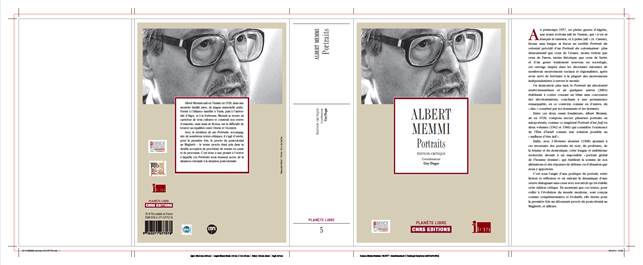Editor’s Note
Volume 5, issues 3-4 of Sephardic Horizons is devoted largely to the work of Albert Memmi. As he approaches his ninety-fifth birthday, there is renewed interest in the continuing relevancy of the work of this distinguished philosopher and francophone Jew of Tunisian origin. Though his early writings were taken up by the anti-colonial movements around the world, many of his essays, and especially his fiction and poetry, express the anxieties and dilemmas of Sephardim--of Jews everywhere--in the age of nationalism. His writings on Jews and Arabs are still highly relevant today in this age of Islamism. Three new publications attest to the renewed interest in Memmi’s work. Guy Dugas’ new edition with CNRS bringing together all of Memmi’s Portraits, Lia Brozgal’s Beyond Autobiography: Albert Memmi and the Production of Theory (of which we include an excerpt, by kind permission of the author and publisher) http://www.nebraskapress.unl.edu/product/Against-Autobiography,675714.aspx, and The Desert, forthcoming in October in my English translation, Memmi’s novel of a fictional prince in medieval North Africa, living in an age where Jews and Muslims coexisted in a cultural symbiosis, http://syracuseuniversitypress.syr.edu/fall-2015/desert.html.
Our special issue on Memmi’s work includes five articles: with Memmi’s kind permission, an extract from his unpublished diary of 1955-1956, when he had returned to Tunisia from France to participate in the independence movement; an original article by Guy Dugas on Memmi’s theory of ‘writing in colors’; the extract from Lia Brozgal’s new book on the confusion between fiction and autobiography on the part of critics (a confusion fomented by the author himself); Edmond Jouve’s view of Memmi’s crossings of boundaries in “Albert Memmi, passeur de mondes” (Professor Jouve wrote to me, “Que ne ferions-nous pas pour notre cher Albert Memmi?”--What wouldn’t I do for my dear friend Albert Memmi?); and my own comparative study of the end of colonialism in novels by Albert Memmi and the Algerian novelist Kateb Yacine. We hope that these five contributions, together, give an appropriate impression of the scope of Memmi’s important work. Readers might also like to consult one of the earlier issues of this journal, where we published an interview by Dov Maimon, a short essay by Memmi, and a few of his poems in English translation by Ralph Tarica, to get a more rounded view of Memmi’s work. Please see http://www.sephardichorizons.org/Volume1/Issue3-4/Memmi.html.
The section in Ladino/Judeo-Spanish is enriched by two prose contributions by Rivka Abiry and Hernán Rodríguez Fisse. We are very grateful to these authors for their faith in Sephardic Horizons, as we are to all the authors in this issue. The final section includes five book reviews. Ralph Tarica encounters Sephardi Lives, Marc Herman reviews Maimonides in his World, Mark Lazerson discusses Vicolo degli Azzimi, and I review Lia Brozgal’s Against Autobiography: Albert Memmi and the Production of Theory. Steven Sage contributes a review of a book about a Bulgarian Jew in the Amazonian jungle, and Rosine Nussenblatt discusses an exhibit held recently in Washington DC, “Synagonistis: Greek Jews in the National Resistance.”
This issue is dedicated to the memory of Ida Danon, z”l, a beloved member of Vijitas de Alhad of Washington DC, who always brought a special spark of joy and enthusiasm to our Vijitas.
With grateful thanks to Albert Memmi, to Guy Dugas in particular (who despite serious family health crises has managed to support this issue in many ways), Lia Brozgal, Edmond Jouve, and all the other contributors whose writing you may find here. Thanks also to our webmaster, Josh Clark, and to Jacques Roumani, Albert Garih and Dalia Kandiyoti for their special help.
Judith Roumani
Editor, Sephardic Horizons

